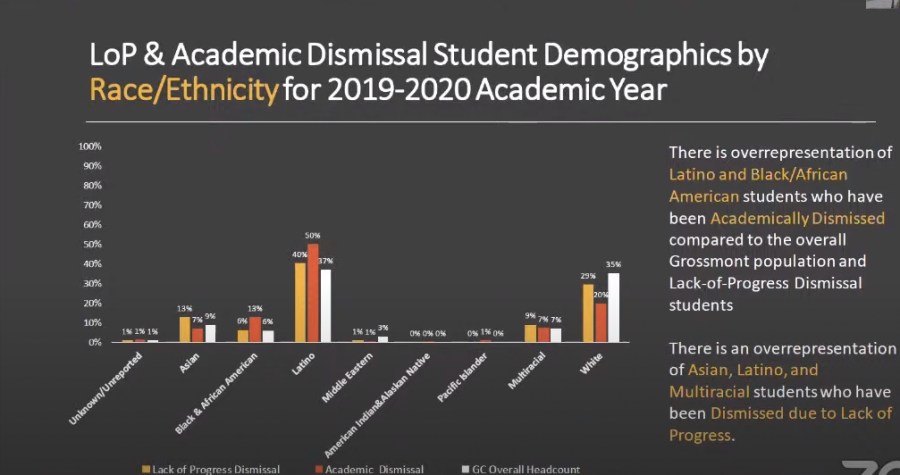Troubling Data
Student academic probation and dismissal disproportionately affects students of color.
June 18, 2021
The final Academic Senate meeting of the school year covered student probation and dismissal among its topics.
Counselor Karolia Macias and AOJ Professor Sharon Sampson, members of the Student Success and Equity Committee, presented a data overview of the topic.
Right now, academic probation at Grossmont College occurs when any student taking a minimum of 12-semester units falls below a 2.0-grade point average (GPA). There is also lack-of-progress probation, which occurs when a student taking a minimum of 12 units and the student’s cumulative units indicate 50 percent or more units of withdrawals (W), incomplete (I) or no passes (NP).
Macias covered academic probation which showed an “overrepresentation of Latino, Black and African American, Middle Eastern, and multiracial students compared to overall Grossmont College headcount.”
A significant percentage of male students also had a higher percentage of academic probation versus females, by nearly 10 percent. Similarly, the statistics for lack of progress probation were around the same as academic probation.
Sampson covered academic dismissal and lack of progress dismissal. Academic dismissal occurs when a student’s GPA falls below 2.0. If the student’s cumulative GPA is still above a 2.0, they go on probation rather than being dismissed.
Lack of progress dismissal is when any student already on lack of progress dismissal shows no signs of work indicating they will improve above 50 percent courses of W, I or NP.
“Black and African American and Latinos show high numbers of academic dismissal,” Sampson said. “There is overrepresentation of Latino and Black/African-American students who have been academically dismissed compared to the overall Grossmont population. There is an overrepresentation of Asian, Latino and multiracial students who have been dismissed due to lack of progress.”
There was also a significantly higher number of academic dismissals and lack of progress dismissals for Grossmont’s female population versus the male population.
Macias said she was hopeful faculty would take the information back to their departments and show the stark differences, so that change can happen to resolve these wide margins in percentage differences within probation and dismissals among different ethnicities, genders and ages.
Denise Shulmeyer facilitated the May 17 meeting, which was officially her last as Academic Senate president. Pearl Lopez took over on June 8.
This Academic Senate will not meet again until Aug. 16, the first day of instruction for the Fall 2022 semester.





















